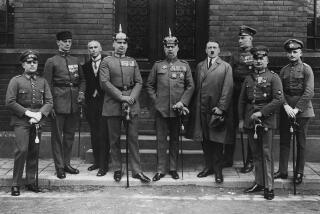A Yankee in Karl Marx’s Court Plays All America’s Role
- Share via
LEIPZIG, East Germany — If you are an American in West Germany or Italy, England or France, or in most of the major tourist countries of the world, you are nothing unusual, just one of the millions who have stormed the gates of the Old World looking for culture, entertainment and relaxation in the wake of the heights reached by the once-mighty (now sinking) dollar. But if you venture across the thin line that Winston Churchill dubbed the Iron Curtain, the situation changes immediately. Here you are unique, exotic, mysterious, a representative of a strange and different world about which everyone has heard but no one has seen. Like it or not, you are seen not as a tourist but as a precious source of first-hand information.
America. This one word evokes a kaleidoscope of images here--cowboys and Indians, movie stars, unemployment, nuclear missiles, rock music, jeans, great universities, discrimination against black people. America--the home of freedom, the home of oppression, the land of decadence and sexual perversity, the land of conservativism and Puritanism, a confusion of many voices, many cultures, all in the same huge enigmatic country, a bundle of contradictions that arouses feelings of love and hate, fascination and repulsion.
On the one hand there is the picture painted every day by the official press (and of course there is no press but the official press). It is a picture fitted into the Procrustes’ Bed of orthodox Marxist-Leninist ideology, in which the vast majority of Americans are oppressed and exploited by a rich and privileged few, in which everyone is either unemployed or a millionaire, and in which there is no such thing as a middle class. In this America crime is an every-minute occurrence, and one dare not stick one’s head out the front door for fear of the civil war in the streets. In this America mothers are forced to sell their children for hard cash, and nice little black girls are routinely beaten up by the racist white police. It is a country in which only the very rich would ever want to live, while the vast majority of the population, freed from the manipulation to which they are subjected every day by the controlled capitalist press, would long for the comfort and security of life in--just to pick a country out of a hat--East Germany.
On the other hand there is a substantially different picture painted day and night by a medium that escapes control. Ordinary East Germans know that what they read in the newspaper every day is--to put it tactfully--not always entirely in accordance with reality. These people have no access to Western magazines and newspapers, but in most areas they can tune into West German television. Observing the forbidden and forbidding West through that window, they have an inkling that perhaps America may be a country in which the dichotomy makes room for surprises. As one young border guard told me when he looked at my passport, “In America, everything is possible.”
But what is possible is not always imaginable. One of the first words that pops into an East German’s head when he hears about America is unemployment. The reverse of that, the high rate of social and job mobility, is impossible to understand in a country where one normally has only one job from the age of 18 to retirement at 65, and where one tends to stay where one was born. Another exotic Western export that rings no bells is feminism. Here, a woman’s chief job--in spite of the fact that most women work outside the home--continues to be to find a husband, have children and bring them up to be proud citizens of the German Democratic Republic.
It is a strange mixture of knowledge and ignorance, curiosity and distrust that greets the American visitor, agent of the world imperalist conspiracy and defender of liberty. Both extremes thrive in a conflicted way between political and ideological egos, superegos and ids: One would love to go to America, but one knows that one shouldn’t want to go, and that one can’t anyway. The id loves America, the superego hates it, and the ego doesn’t quite know what to think.
There is one thing that the East German is sure of: The American knows nothing about Europe, while the European knows a great deal about America--a bit of Old World arrogance with a kernel of truth.
So, the Americans come and then go, and the ordinary East Germans look through them to the West, while the government looks over its shoulder at Moscow, hoping somehow to hold the whole thing together, even as “Dallas” plays on a million television sets, “Born in the U.S.A.” on thousands of stereos.
More to Read
Sign up for The Wild
We’ll help you find the best places to hike, bike and run, as well as the perfect silent spots for meditation and yoga.
You may occasionally receive promotional content from the Los Angeles Times.






